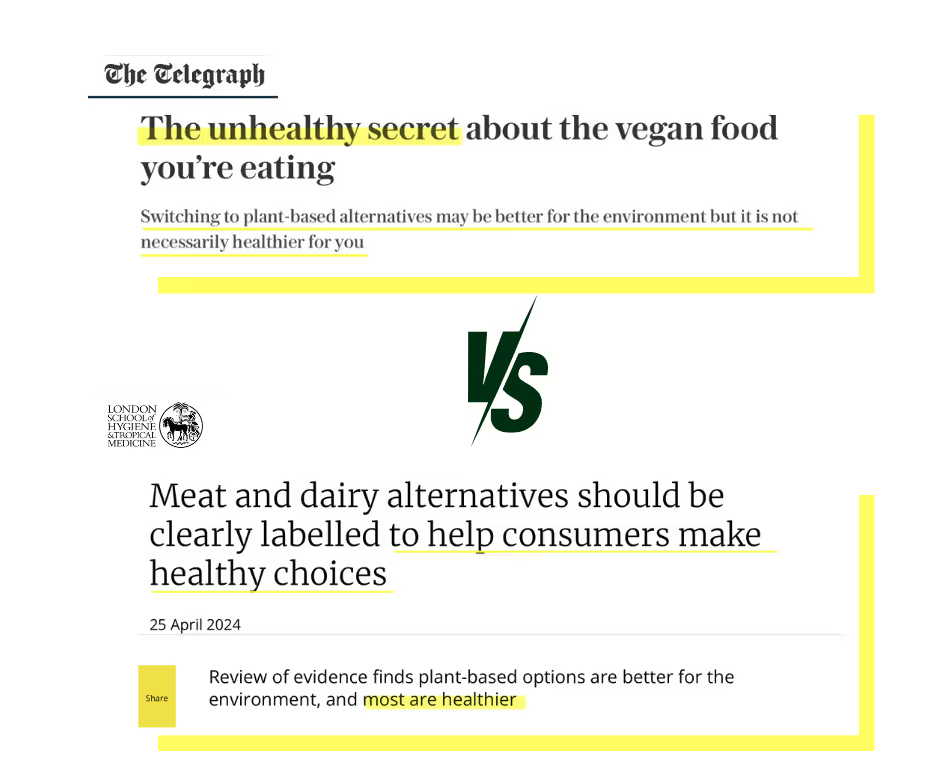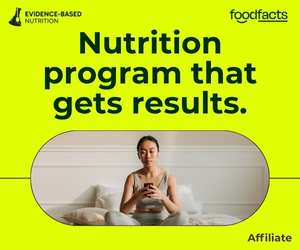
Beyond Headlines: Fact-checking The Telegraph’s claims on the health effects of plant-based alternatives





Coral Red: Mostly False
Orange: Misleading
Yellow: Mostly True
Green: True
Learn more about our fact-checking policies
On April 25th, 2024, The Telegraph published an article entitled “The unhealthy secret about the vegan food you’re eating.” The subheadline adds: “Switching to Plant-Based Alternatives may be better for the environment, but it is not necessarily healthier for you.”
Our analysis aims to evaluate the claim made in the subheadline against the evidence provided in the article and broader scientific evidence.
The study concluded that clearer labeling was recommended to help consumers make healthy choices. However, the study’s conclusions did not support warning signs to raise awareness of the ultra-processed nature of Novel Plant-Based Foods (NPBFs). Rather, it suggested a subdivision of NPBFs, as some offer better nutritional value than others. This could support a shift towards more sustainable AND healthy diets.
Interpreting nutrition research is a complex matter. Sensational headlines might not only distort the interpretation of study findings, they can also impact our understanding of the scientific process and how nutrition works. While we might be left with the impression that a single study has finally uncovered THE secret about a food type or nutrient, it is the totality and the balance of the evidence which informs nutritional guidelines. Read on to get the full picture.

Be skeptical of absolute statements. When a sensational headline is reporting on recent study findings, look for the University's press release, which will most likely be more balanced.
The Telegraph’s eye-catching headlines were based on their report of a recently published study conducted by researchers from the London School of Hygiene and Tropical Medicine and the University of Leeds. The study systematically reviewed fifty-seven peer-reviewed journal articles and thirty-six grey literature sources, published in 2016–2022, and which “contained data on the nutrient composition, health impacts, and environmental impacts of Novel Plant-Based Foods (NPBFs).”
The University’s press release summarised the findings as follows, “Review of evidence finds plant-based options are better for the environment, and most are healthier,” concluding that clearer labelling would be beneficial. The University’s conclusions contrast with The Telegraph’s reporting on the study, which appears to emphasise an unhealthy stigma around plant-based alternatives. To get the full picture, let’s fact-check the above claim step by step:
CLAIM 1: Plant-Based (PB) alternatives may be “better for the environment.”
FACT-CHECK: The study did observe that typically, most plant-based alternatives have much lower environmental impacts compared with their animal counterparts. This is especially clear for Greenhouse Gas Emissions (GHGE), but also for Land Use (LU) and Water Footprint (WF). The study’s authors also noted that caution should be exerted not to over-interpret “exact numerical results”:
“Environmental impact calculations are notoriously context dependent and sensitive to methodological and data choices. This makes it impossible to come up with a summary figure that is representative for all products, produced in all countries.”
What they found, however, was that the general direction of the evidence was consistent, highlighting a “broad body of evidence demonstrating a reduction in GHGE, LU, and WF for a wide range of PB products in a wide variety of contexts compared with their ABF [Animal-Based Food] equivalents.”
CLAIM 2: But they (PB alternatives) are “not necessarily healthier for you.”
FACT-CHECK: The Telegraph’s coverage differs from the study’s conclusions. While whole plant foods remain “the gold standard,” according to first author Sarah Najera Espinosa, the study focuses on the positive role of NPBFs as stepping stones towards achieving not only more sustainable but also possibly healthier diets.
The nutritional value of the NPBF products available varies greatly, hence the suggestion for clearer labelling to help consumers make informed choices. Plant-based alternatives currently all fall within the broad ‘ultra-processed’ category, which tends to be considered by consumers as unhealthy. A subdivision of these products would help distinguish between less health-promoting products and those which offer greater nutritional value. This clarification is mentioned in The Telegraph’s article. However, the article’s introduction directly attributes the suggestion for clear labelling to the public’s lack of awareness regarding the ultra-processed nature of plant-based alternatives, echoing The Independent’s choice of headline: “Calls for plant-based alternatives to be labelled with warning signs.” Such headlines do not reflect the findings of the study which both outlets are reporting on.

What is the Ultra-Processed Debate surrounding Plant-Based alternatives about?
The main reason why NPBFs tend to be portrayed as “not necessarily healthier for you” is because they fall within the broad category of Ultra-Processed Foods (UPFs). However, this latest systematic review points to the need for nuance, as all plant-based alternatives are not created equal.
- What is the problem with Ultra-Processed Foods?
“Ultra-processed foods have been associated with many diet-related diseases because these foods are generally energy dense and hyper-palatable.” The study’s authors note that although all NPBFs technically fall within the category of UPFs, not all of them are energy-dense or hyper-palatable. In fact,
“The nutritional composition of some NPBFs aligns well with healthy dietary recommendations, such as having a high fibre content, low energy density, and low saturated fat content.”
Another recurring concern when comparing NPBFs and their Animal-Based (AB) counterparts is their high sodium content. However, similar sodium levels were generally observed between NPBFs and their AB counterparts in the aforementioned study.
Concerns can arise in the case of over-consumption of plant-based substitutes. This cautious approach reinforces the authors’ conclusion that these substitutes should be viewed as stepping stones to a more sustainable, healthier diet, focusing on plant-based whole foods as the bulk of one’s diet.
- What should we look out for when buying plant-based alternatives?
The study highlights the need to look out for options which offer a high fibre content, low energy density and low saturated fat content. When those criteria are met, they conclude:
“From the limited evidence on health, the inclusion of NPBFs into diets appears to typically have beneficial health effects, particularly the consumption of PB meat alternatives. The positive health effects mostly relate to better weight management and associated reduced risk of noncommunicable diseases in high-income (and often obesogenic) countries.”
Final Take Away
Let’s revisit the initial claim that a switch from animal-based products to plant-based alternatives was not necessarily healthier. The study’s authors note that a complete switch is rarely observed, as new evidence suggests that “people who consume NPBFs also tend to purchase ABFs.” They therefore warn against the tendency to push a narrative which defends the superiority of one product against the other:
“Instead of continuing the debate between the superiority of ABFs vs NPBFs, or vice versa, acknowledging and embracing their complementary differences can contribute to a less polarised dietary transition.”
Clearer labelling of plant-based alternatives could therefore favour not only better informed choices, but also encourage a more realistic transition towards plant-centred diets, which a stark opposition between NPBFs and ABFs might make harder.
We have reached out to The Telegraph and the study's lead author for comments and are waiting for their responses. This fact-check will be updated with any comments or clarifications we receive.
Stand Against Nutrition Misinformation
Misinformation is a growing threat to our health and planet. At foodfacts.org, we're dedicated to exposing the truth behind misleading food narratives. But we can't do it without your support.
Sources
The Telegraph:
https://www.telegraph.co.uk/news/2024/04/25/unhealthy-secret-about-the-vegan-food-youre-eating/
https://www.telegraph.co.uk/health-fitness/diet/nutrition/vegan-meat-burgers-healthy-fat/
Nutrition Reviews:
https://academic.oup.com/nutritionreviews/advance-article/doi/10.1093/nutrit/nuae031/7656938
London School of Hygiene and Tropical Medicine Website:
Nature:



foodfacts.org is an independent non-profit fact-checking platform dedicated to exposing misinformation in the food industry. We provide transparent, science-based insights on nutrition, health, and environmental impacts, empowering consumers to make informed choices for a healthier society and planet.

Was this article helpful?
















.svg)
